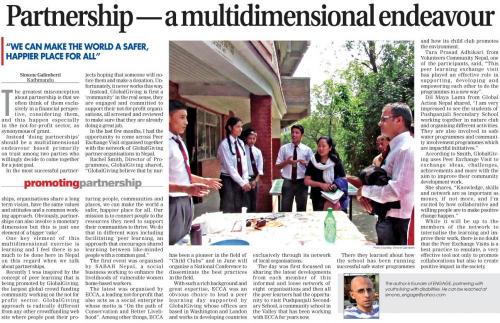
The greatest misconception about partnership is that we often think of them exclusively in a financial perspective, considering them, and this happen especially in the not-for-profit sector, as synonymous of grant.
Instead ‘doing partnerships’ should be a multidimensional endeavour based primarily on trust among two parties who willingly decide come together for a joint goal.
In the most successful partnerships, organisations share a long term vision, have the same values and attitudes and a common working approach. Obviously, partnerships can also involve a monetary dimension but this is just one element of a bigger ‘cake’.
One key element of this multidimensional exercise is learning and I feel there is so much to be done here in Nepal on this regard when we talk about partnerships.
Recently I was inspired by the concept of peer learning that is being promoted by GlobalGiving, the largest global crowd funding community working on the not for profit sector. GlobalGiving approach is radically different from any other crowdfunding web site where people post their projects hoping that someone will notice them and make a donation. Unfortunately, it never works this way.
Instead, GlobalGiving is first a ‘community’ in the real sense, they are engaged and committed to support their not-for-profit organisations, all screened and reviewed to make sure that they are already doing a great job.
In the last few months I had the opportunity to come across Peer Exchange Visit organised together with the network of GlobalGiving partner organisations in Nepal.
Rachel Smith, Director of Programmes, GlobalGiving shared, “GlobalGiving believe that by nurturing people, communities and places, we can make the world a safer, happier place for all. Our mission is to connect people to the resources they need to support their communities to thrive. We do that in different ways including facilitating 'peer learning, an approach that encourages shared learning between like-minded people with a common goal.”
The first event was organised by SABAH Nepal, a social business working to enhance the livelihoods of vulnerable women home-based workers.
The latest was organised by ECCA, a leading not-for-profit that also acts as social enterprise whose motto is “On the path of Conservation and Better Livelihood”. Among other things, ECCA has been a pioneer in the field of “Child Clubs” and in June will organise a National Conference to disseminate the best practices in the field.
With such a rich background and great expertise, ECCA was an obvious choice to lead a peer learning day supported by GlobalGiving whose offices are based in Washington and London and works in developing countries exclusively through its network of local organisations.
The day was first focussed on sharing the latest developments from each member of this informal and loose network of eight organisations and then all the peer learners had the opportunity to visit Pushpanjali Secondary School, a community school in the Valley that has been working with ECCA for years now.
There they learned about how the school has been running successful safe water programmes and how its child club promotes the environment.
Tara Prasad Adhikari from Volunteers Community Nepal, one of the participants, said, “This peer learning exchange visit has played an effective role in supporting, developing and empowering each other to do the programmes in a new way”.
Dil Maya Lama from Global Action Nepal shared, “I am very impressed to see the students of Pushpanjali Secondary School working together in nature club and organising different activities. They are also involved in safe water programmes and community involvement programmes which are impactful initiatives.”
According to Smith, GlobalGiving uses Peer Exchange Visit to exchange ideas, challenges, achievements and more with the aim to improve their community development work.
She shares, “Knowledge, skills and network are as important as money, if not more, and I'm excited by how collaborative and willing people are to make positive change happen.”
While it will be up to the members of the network to internalise the learning and improve their work, there is no doubt that the Peer Exchange Visits is a best practice to emulate, a very effective tool not only to promote collaborations but also to create positive impact in the society.










Add new comment